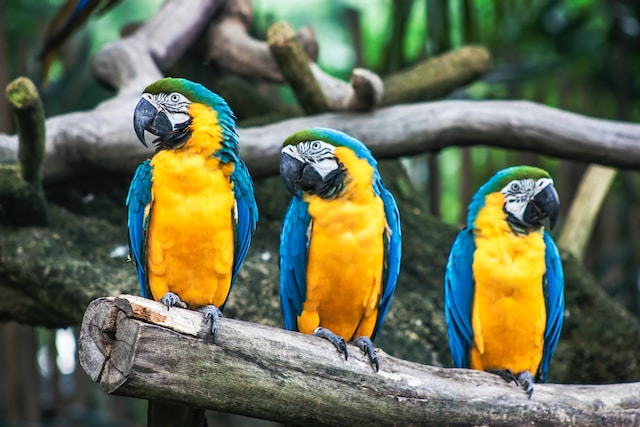Parrots, with their high intelligence and curious nature, are incredibly receptive to training. Teaching your parrot tricks and desirable behaviors not only strengthens the bond between you and your feathered friend but also provides mental stimulation and enrichment. In this article, we explore effective techniques and strategies for successful parrot training. Positive Reinforcement: Positive reinforcement
Parrots, with their high intelligence and curious nature, are incredibly receptive to training. Teaching your parrot tricks and desirable behaviors not only strengthens the bond between you and your feathered friend but also provides mental stimulation and enrichment. In this article, we explore effective techniques and strategies for successful parrot training.
- Positive Reinforcement: Positive reinforcement is the foundation of successful parrot training. Rewarding desired behaviors with treats, praise, or affection reinforces the connection between the behavior and the reward, encouraging your parrot to repeat the action. It is important to use rewards that are highly motivating for your parrot, such as their favorite treats or toys.
- Consistency and Patience: Consistency is key when training your parrot. Set a regular training schedule and allocate short, focused training sessions. Keep the sessions fun and engaging, but also be patient. Parrots learn at their own pace, so it is important to remain consistent, calm, and patient throughout the training process.
- Target Training: Target training involves teaching your parrot to touch a designated target, such as a stick or a small object, with their beak or foot. This technique forms the basis for teaching other tricks and behaviors. By gradually moving the target, you can guide your parrot to perform specific actions and encourage them to learn new behaviors.
- Clicker Training: Clicker training is a popular method used to train parrots. It involves using a clicker, a small device that makes a distinct sound, to mark the desired behavior as soon as it occurs. The clicker serves as a precise signal to your parrot that they have performed the correct action, followed by an immediate reward. This technique helps your parrot associate the clicker sound with positive reinforcement.
- Step-Up and Step-Down Commands: Teaching your parrot the step-up and step-down commands is essential for easy handling and interaction. Start by offering your finger or a perch and gently say “step-up” while encouraging your parrot to climb onto your hand. Similarly, use the command “step-down” when you want your parrot to move from your hand or perch onto another surface. Repeat these commands consistently and reward your parrot for following them.
- Vocalization Training: Parrots are renowned for their ability to mimic sounds and human speech. You can encourage your parrot to mimic certain words or phrases by consistently repeating them in a clear and distinct manner. Be patient, as it may take time for your parrot to associate the words with their meanings and reproduce them accurately. Remember to reward your parrot when they make progress.
- Problem-Solving Games: Engage your parrot in problem-solving games that stimulate their mental abilities. Hide treats in puzzle toys or teach them to retrieve objects. These activities challenge your parrot’s problem-solving skills, encourage exploration, and keep their minds active and engaged.
- Socialization and Interaction: Regular socialization and interaction are crucial for a well-rounded parrot. Expose your parrot to different people, environments, and situations. Encourage gentle handling and supervised out-of-cage time for exercise and play. This helps your parrot develop trust, confidence, and a positive disposition towards new experiences.
Remember, training should always be a positive and enjoyable experience for both you and your parrot. Respect your parrot’s individual personality and preferences, and never resort to punishment or force during training. Always prioritize the well-being and welfare of your feathered friend.
Parrot training is a rewarding endeavor that deepens the bond between you and your companion while providing mental stimulation and enrichment. Through positive reinforcement, consistency.

















Leave a Comment
Your email address will not be published. Required fields are marked with *